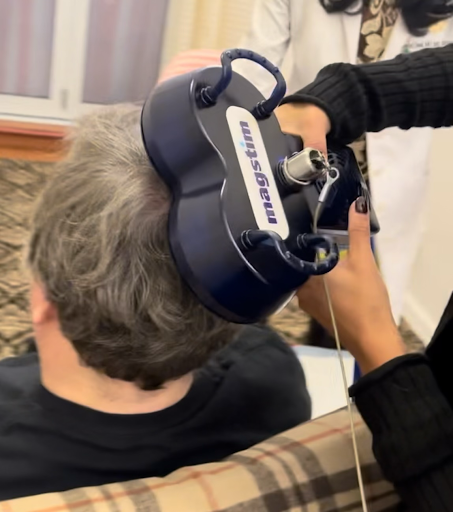
What do tinnitus, depression, migraines, fibromyalgia, dementia, and movement disorders have in common? One of the biggest challenges in treating these conditions is finding effective and safe treatment options. Traditional medication and therapy can be helpful, but they may not be enough for some patients. This is where transcranial magnetic stimulation (TMS) comes in as a promising treatment option.
WHAT IS TMS?
TMS is a non-invasive procedure that involves placing a coil on the scalp which generates magnetic pulses that stimulate brain cells. These magnetic pulses are delivered to specific areas of the brain’s prefrontal cortex that involve either mood regulation, cognition, pain or movement. By stimulating the targeted area, TMS has been shown to improve the symptoms of depression and other mood disorders, as well as cognition in selected Alzheimer’s patients. Even some soldiers with traumatic brain injuries resulting in paralysis or reduced movement have found benefit with TMS in improvement in their mobility and function.
WHY HAVE I NEVER HEARD OF TMS?
The history of TMS dates back to the 1980s when researchers first began to explore its potential as a psychiatric treatment. Despite numerous studies showing its effectiveness, TMS has been slow to take off as a mainstream treatment option. This is likely due to several reasons, including limitations in availability, cost for non-FDA approved indications, and to misconceptions about the TMS procedure, with some people associating it with electroconvulsive therapy (ECT), which involves electrically inducing seizures in the brain – a more aggressive treatment.
However, TMS is very different from ECT, it does not require anesthesia or any other type of sedation and doesn’t typically result in seizures or any other dangerous side effects when applied properly. While breaks are built into TMS protocols to avoid potential seizure by allowing the neurons to relax between stimulation, there is a < 1% risk of seizure according to NIH (much less than ECT) if the coil slips and hits the wrong movement part of the brain, for example if a clinic were using a robotic arm to hold the magnet in place and the patient fell asleep and no one was watching. The main side effect some patients notice from TMS is occasionally headache, and I’ve heard the experience of TMS be described at worst as feeling like a chicken is pecking at your head. TMS was approved by the FDA in 2008 for the treatment of depression, and since then, numerous studies have demonstrated its efficacy in treating a range of other cognitive and health conditions, including tinnitus (ear ringing), autism, obsessive compulsive disorder, post-traumatic stress disorder, early Alzheimer’s Dementia, and even movement disorders.
Despite the benefits in multiple conditions, it can be challenging for people to access TMS treatment. There are relatively few clinics in the United States that offer this type of therapy. Also, if not being used for one of the limited FDA-approved indication or without documented failure of other treatments, it can be expensive. Currently, it’s only FDA approved for certain mental health conditions including depression, and is on the cusp of FDA approval for Alzheimer’s Dementia. However, as the importance of brain health and mental wellness continues to gain recognition across the country, more treatment options are becoming available.
FUTURE OF TMS
Transcranial magnetic stimulation (TMS) is a promising treatment option with a long history of research and demonstrated effectiveness in select psychiatric and neurological conditions such as major depression and obsessive compulsive disorder (OCD). While it has faced some obstacles in becoming a mainstream treatment option, it offers great potential for improving mental, cognitive and even physical health and well being.
I’m curious as TMS becomes more mainstream and portable how this technology can be used to improve cognition, focus and mood in neurotypical people. I had the pleasure of attending the BrainMind Conference this October 2023, which brings together scientists, entrepreneurs and investors in the brain-health space dedicated to bridging the valley of death in innovation. There, I had the pleasure of meeting several TMS practitioners, including a physician working with a company making a portable TMS device currently undergoing evaluation for FDA approval, so this treatment could potentially be quite mobile and compact shortly.
Read Also: Nutrition On-the-Go
Maia Mossé, MD, November, 2023
Call The Village Doctor at (650) 851-4747 or Contact us to learn more about the practice.


